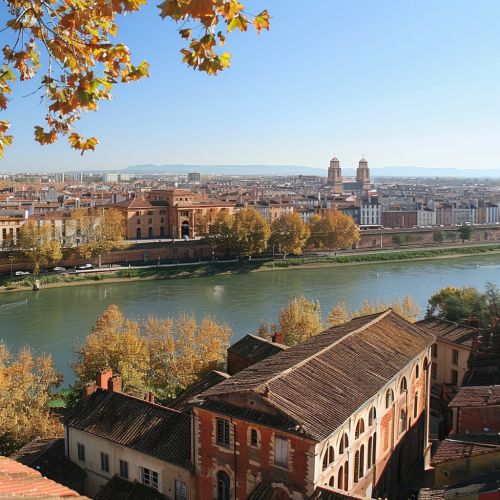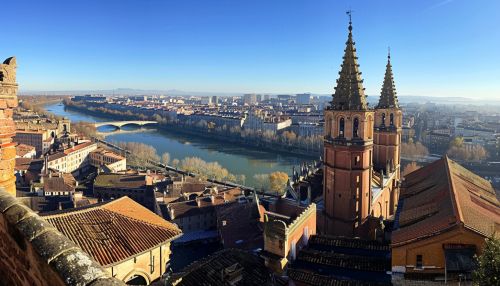Toulouse: Difference between revisions
(Created page with "== History == Toulouse, a city in southwestern France, has a rich and diverse history that dates back to ancient times. Originally known as Tolosa, it was a significant settlement for the Celtic Volcae Tectosages tribe. The city was later incorporated into the Roman Empire in 106 BCE, becoming an important administrative and commercial center. During the Roman period, Toulouse was known for its wealth and was a key hub in the province of Gallia Narbonensis...") |
No edit summary |
||
| Line 5: | Line 5: | ||
In the early Middle Ages, Toulouse became the capital of the [[Visigothic Kingdom]] after the fall of the Western Roman Empire. The city played a crucial role during the [[Merovingian]] and [[Carolingian]] periods, serving as a center of power and culture. The [[Counts of Toulouse]] emerged as influential rulers, and the city became a focal point of the [[Albigensian Crusade]] in the 13th century, a campaign initiated by the Catholic Church to eliminate the [[Cathar]] heresy. | In the early Middle Ages, Toulouse became the capital of the [[Visigothic Kingdom]] after the fall of the Western Roman Empire. The city played a crucial role during the [[Merovingian]] and [[Carolingian]] periods, serving as a center of power and culture. The [[Counts of Toulouse]] emerged as influential rulers, and the city became a focal point of the [[Albigensian Crusade]] in the 13th century, a campaign initiated by the Catholic Church to eliminate the [[Cathar]] heresy. | ||
[[Image:Detail-79189.jpg|thumb|center|A panoramic view of the city of Toulouse, showing its historic architecture and the Garonne River.|class=only_on_mobile]] | |||
[[Image:Detail-79190.jpg|thumb|center|A panoramic view of the city of Toulouse, showing its historic architecture and the Garonne River.|class=only_on_desktop]] | |||
== Geography == | == Geography == | ||
Latest revision as of 12:17, 17 May 2024
History
Toulouse, a city in southwestern France, has a rich and diverse history that dates back to ancient times. Originally known as Tolosa, it was a significant settlement for the Celtic Volcae Tectosages tribe. The city was later incorporated into the Roman Empire in 106 BCE, becoming an important administrative and commercial center. During the Roman period, Toulouse was known for its wealth and was a key hub in the province of Gallia Narbonensis.
In the early Middle Ages, Toulouse became the capital of the Visigothic Kingdom after the fall of the Western Roman Empire. The city played a crucial role during the Merovingian and Carolingian periods, serving as a center of power and culture. The Counts of Toulouse emerged as influential rulers, and the city became a focal point of the Albigensian Crusade in the 13th century, a campaign initiated by the Catholic Church to eliminate the Cathar heresy.


Geography
Toulouse is situated on the banks of the Garonne River, approximately 150 kilometers from the Mediterranean Sea and 230 kilometers from the Atlantic Ocean. The city's geographical location has contributed to its historical significance as a crossroads for trade and cultural exchange. The region is characterized by a temperate climate, with mild winters and warm summers, making it an attractive destination for both residents and visitors.
The city's topography is relatively flat, with the Pyrenees Mountains to the south providing a scenic backdrop. The Garonne River divides the city into two main areas: the historic center on the right bank and the more modern districts on the left bank. Toulouse's urban landscape is a blend of medieval architecture, Renaissance buildings, and contemporary structures, reflecting its long and varied history.
Economy
Toulouse is a major economic hub in southwestern France, known for its thriving aerospace and aviation industries. The city is home to the headquarters of Airbus, one of the world's leading aircraft manufacturers, and numerous other aerospace companies. The presence of these industries has earned Toulouse the nickname "Aerospace Valley."
In addition to aerospace, Toulouse has a diverse economy that includes sectors such as information technology, biotechnology, and education. The city is a center for research and development, with several prestigious institutions, including the University of Toulouse, contributing to its reputation as a hub of innovation and knowledge.
The agricultural sector also plays a significant role in the regional economy, with the surrounding countryside producing a variety of crops, including sunflowers, maize, and wine. Toulouse's strategic location and well-developed transportation infrastructure, including its international airport and extensive rail network, further enhance its economic vitality.
Culture
Toulouse is renowned for its vibrant cultural scene, which encompasses a wide range of artistic and intellectual activities. The city has a rich musical heritage, particularly in classical music and opera. The Théâtre du Capitole is one of the most prestigious opera houses in France, hosting performances by world-class artists and ensembles.
The city is also known for its contributions to literature and philosophy. Toulouse has been home to several notable writers and thinkers, including Jean-Jacques Rousseau and Paul Valéry. The city's literary tradition is celebrated through various festivals and events, such as the Marathon des Mots, an annual literary festival that attracts authors and readers from around the world.
Toulouse's cultural landscape is further enriched by its numerous museums, galleries, and historical sites. The Musée des Augustins, housed in a former Augustinian monastery, features an extensive collection of medieval and Renaissance art. The Cité de l'Espace, an interactive space museum, reflects the city's strong ties to the aerospace industry.
Education
Education is a cornerstone of Toulouse's identity, with the city boasting a long tradition of academic excellence. The University of Toulouse, founded in 1229, is one of the oldest universities in Europe and a leading center for higher education and research. The university comprises several campuses and specialized institutions, offering a wide range of programs in fields such as science, engineering, humanities, and social sciences.
Toulouse is also home to numerous other educational institutions, including the Institut National des Sciences Appliquées de Toulouse (INSA), a prestigious engineering school, and the Toulouse Business School, which is recognized for its programs in business and management. These institutions attract students from around the world, contributing to the city's dynamic and diverse academic community.
The city's commitment to education extends to the primary and secondary levels, with a well-developed network of public and private schools. Toulouse places a strong emphasis on providing high-quality education and fostering a culture of lifelong learning.
Transportation
Toulouse has a comprehensive transportation system that facilitates easy movement within the city and connects it to other regions. The Toulouse-Blagnac Airport serves as a major international gateway, offering flights to numerous destinations across Europe and beyond. The airport's proximity to the city center makes it a convenient option for travelers.
The city's public transportation network includes buses, trams, and a metro system, operated by Tisséo. The metro, consisting of two lines, provides efficient and reliable service to key areas of the city, while the tram network complements the metro by serving additional routes. Toulouse also promotes sustainable transportation options, with an extensive network of bicycle lanes and bike-sharing programs.
Toulouse's strategic location makes it a key hub in the regional and national transportation network. The city is well-connected by high-speed rail (TGV) to major cities such as Paris, Bordeaux, and Marseille. The A61 and A62 motorways provide easy access to other parts of France, further enhancing the city's connectivity.
Architecture
Toulouse's architectural heritage is a testament to its long and varied history. The city's historic center is characterized by its distinctive red-brick buildings, earning it the nickname "La Ville Rose" (The Pink City). This unique architectural style is particularly evident in landmarks such as the Basilica of Saint-Sernin, one of the largest Romanesque churches in Europe, and the Capitole de Toulouse, the city's iconic town hall and opera house.
The city's architectural landscape also includes notable examples of Gothic, Renaissance, and modernist styles. The Church of the Jacobins, with its impressive Gothic architecture and stunning palm-tree vaulting, is a must-see for visitors. The Hôtel d'Assézat, a Renaissance mansion, now houses the Bemberg Foundation's art collection.
In recent years, Toulouse has embraced contemporary architecture, with new developments and innovative designs contributing to the city's evolving skyline. The Cartoucherie eco-district is an example of sustainable urban planning, featuring energy-efficient buildings and green spaces.
Demographics
Toulouse is the fourth-largest city in France, with a population of over 470,000 residents. The metropolitan area, known as Toulouse Métropole, has a population of approximately 1.3 million, making it one of the fastest-growing urban areas in the country. The city's population is diverse, with a mix of native French residents and immigrants from various countries.
The presence of numerous universities and research institutions contributes to a youthful and dynamic demographic profile. Students and young professionals make up a significant portion of the population, creating a vibrant and energetic atmosphere. Toulouse's multiculturalism is reflected in its diverse culinary scene, festivals, and cultural events.
Science and Technology
Toulouse is a leading center for science and technology, particularly in the fields of aerospace, space exploration, and information technology. The city's strong ties to the aerospace industry are exemplified by the presence of Airbus and the Centre National d'Études Spatiales (CNES), the French space agency. Toulouse is also home to the European Space Agency's (ESA) European Space Operations Centre.
The city's research and development ecosystem is supported by numerous institutions and organizations, including the Institut de Recherche en Informatique de Toulouse (IRIT) and the Laboratoire d'Analyse et d'Architecture des Systèmes (LAAS-CNRS). These institutions collaborate with industry partners to drive innovation and technological advancements.
Toulouse's commitment to science and technology is further demonstrated by its investment in education and research infrastructure. The Toulouse School of Economics (TSE) is a world-renowned institution specializing in economic research and education. The city's focus on fostering a culture of innovation has made it a hub for startups and tech companies, contributing to its reputation as a leading center for science and technology.
Sports
Toulouse has a rich sporting tradition, with a particular emphasis on rugby union. The city's rugby team, Stade Toulousain, is one of the most successful clubs in Europe, with numerous national and international titles. The team's home matches at the Stade Ernest-Wallon attract large crowds and create a vibrant atmosphere.
In addition to rugby, Toulouse is home to several other sports teams and facilities. The Toulouse FC football club competes in Ligue 1, the top tier of French football, and plays its home matches at the Stadium de Toulouse. The city also has a strong presence in basketball, handball, and volleyball, with teams competing at various levels.
Toulouse's commitment to promoting sports and physical activity is evident in its numerous parks, sports complexes, and recreational facilities. The Parc des Sports and the Île du Ramier are popular destinations for outdoor activities, offering a range of amenities for sports enthusiasts.
See Also
- France
- Garonne River
- Airbus
- University of Toulouse
- Basilica of Saint-Sernin
- Stade Toulousain
- European Space Agency
